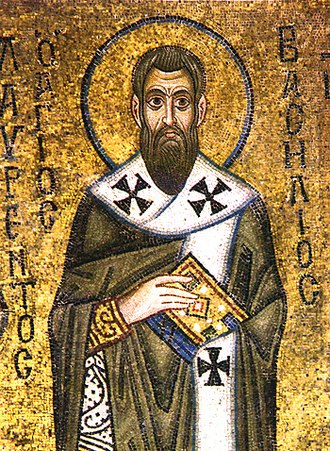Course:Carey HIST501/Project 2/Basil The Great
Lifespan
Born: 329CE
Died: January 1 379CE
Basil was born and died in Caeseria, Cappadocia (Modern Turkey).[1]
Biographical Overveiw of Basil the Great

Basil was born into an upperclass Christian family that had felt the bitterness of persecution in their recent memory. He was one of 10 children and besides him, his family included two brothers and an uncle whom also rose to serve as Bishops. [2]
Basil originally planned to be a lawyer and orator[1] and was educated in Nicomedia, Constantinople and Athens[2][3], where he became friends with Gregory of Nazianzos. He then briefly worked as a teacher before touring monasteries in Syria and Egypt[4]. He was much inspired by the aescetic life and upon returning home established a monastery on his family’s estate, which he stayed at five years. Basil was ordained a priest in 362CE and made Bishop in 370CE following the death of Eusebius[3][1][4].
Along with his brother, Bishop Gregory of Nyssa and friend Gregory of Nazianzos, Basil fought against the acceptance of the Arian Creed following the council of Nicene.[2][4] This included opposition and dissent towards Arian emperor Valens. Basil attempted to bring unity between the Nicene party and the ‘semi-arian’ agains the Arians through the device of “three persons (hypostases) in one substance (ousiua)” which acknowledged a distinction between the persons of the trinity while emphasizing their unity.[1][3]
Basil suffered from poor health, possibly the result of his aescetical life which he never abandoned, and died just aster the death of Valens.[1][2][3][4]
Major Contributions of Basil the Great:
Basil's major contributions to the church can be observed in manifold written works which touch on theology, monastic and communal life, ehtics and social justice. Some more notable works include:
-Longer Rules and Shorter Rules which were written for the monastic life and are still standard reading for Eastern monastics.
-Hexaemeron ("The Six Days”) is a collection of sermons on how creation reveals God’s glory.
-Address to Young Men was originally written for his nephews and encourages the reader to familiarize themselves with secular/pagan culture as a way to better understand their own Christian faith.[3]
-Against Eunomius is a work which upholds the divinity of the Son against prominent Arian veiws espoused by Eunomius.[1]
-On the Holy Spirit advocates for upholds the divinity of the Holy Spirit as equal in trinitarian nature and therefore as equally deserving of worship as the Father and Son.[3]
In addition to his written work, Basil Advocated for cenobitic forms of monasticism, believing that community and service were necessary aspects of human and monastic life and founded a regime of worship and work for monastics called “the Basilian Rule”.[2]

Both short and long-term impact of Basil the Great
- 329CE Caeseria, Cappadocia (Modern turkey)Basil was made a Saint shortly after his passing and is named as one of the three Cappadocian Fathers in the Eastern tradition.
- Basil fought against the acceptance of the Arian Creed, and the Arian emperor Valens.Wester Christians may know him as one of the Four Greek doctors of the Undivided Church: Basil, Athanasius, John Chrysostom and Gregory of Nazianzos
- Basil fought against the acceptance of the Arian Creed, and the Arian emperor Valens.The monastic community began by Basil has had a lasting impact on Monastic life: While in the west we are familiar with several different kinds of monastic orders, in the East, they are primarily all “Basilian” orders.
- Basil fought against the acceptance of the Arian Creed, and the Arian emperor Valens.Basil was an early advocate for “social justice” whose charitable work both stood for itself and inspired many to follow. When a famine struck Caesarea in 367/368 the Monastic Basil would sell his family’s lands in order to provide food to the hungry in his area. He lead by example in assisting in the soup kitchen personally and in his leadership insisted on the feeding of all without distinction between Christian and non as “the Digestive systems of the two are indistinguishable”. He is also known for building hospitals, hospices, and homes for the poor while intensely disciplining and excommunicating clergy who he felt used their office for their own adancement.[3]
References
- ↑ 1.0 1.1 1.2 1.3 1.4 1.5 Hardy, Edward R. (01/01/2021). "St. Basil the Great". Encyclopedia Britannica. Retrieved 25/10/2021. Check date values in:
|access-date=, |date=(help) - ↑ 2.0 2.1 2.2 2.3 2.4 Authors, Catholic Online (01/01/2021). "St. Basil The Great". Catholic Online. Retrieved 25/10/2021. Check date values in:
|access-date=, |date=(help) - ↑ 3.0 3.1 3.2 3.3 3.4 3.5 3.6 Kiefer, James (17/04/2021). "Basil the Great". Satucket. Retrieved 25/10/2021. Check date values in:
|access-date=, |date=(help) - ↑ 4.0 4.1 4.2 4.3 Cartwright, Mark (12/04/2018). "Basil the Great". World History Encyclopedia. Retrieved 25/10/2021. Check date values in:
|access-date=, |date=(help)